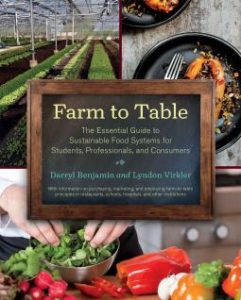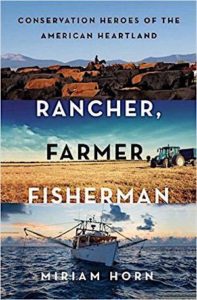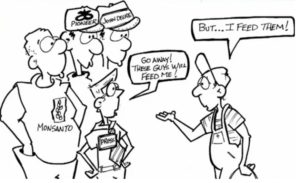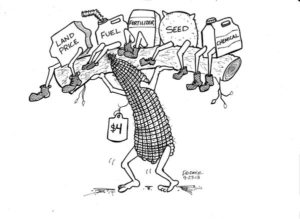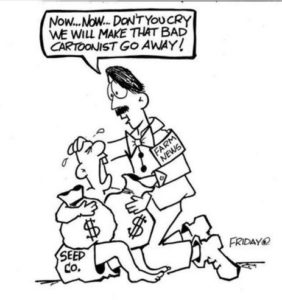A couple of years ago, I wrote a long post attempting to explain the Transatlantic Trade and Investment Partnership (TTIP), a trade agreement under negotiation since then with the European Union. Like all trade agreements, this one is done secretly, making it difficult for interested parties to weigh in.
But Greenpeace Netherlands has now leaked what it says are the texts of 13 chapters of the TTIP. These include 248 pages of internal documents dating from TTIP talks at some uncertain date. These include chapters about food and agriculture, as well as many other issues.
The documents include a 25-page “Tactical State of Play” on the negotiations similar to a 20-page public EU report, but with more detail on points of disagreement and consensus.
Greenpeace claims that the documents demonstrate major risks for the climate, environment and consumer safety. The Office of the U.S. Trade Representative strongly disagrees, and European Trade Commissioner Cecilia Malström says the leaked documents only reflect negotiating positions.
I took a look at the leaked Chapter X Agriculture [US: Market Access]. The European Union proposes, for example:
- [On public health and safety] The Parties recognize that their respective societal choices may differ with respect to public policy decisions affecting agriculture. In this regard, nothing in this Agreement will restrain the Parties from taking measures necessary to achieve legitimate policy objectives such as the protection of public health, safety, environment or public morals, social or consumer protection, or the promotion and protection of cultural diversity that each side deems appropriate.
- [On sustainability] The Parties recall the prominent role of sustainability in its economic, social and environmental dimensions in agriculture and aim at developing a fruitful cooperation and dialogue on agricultural sustainability issues. To this end, the Parties shall work together to…exchange ideas and share experience in developing sustainable farming practices, particularly with regards to organic farming, and environmentally friendly rural development programs.
- [On geographical indicators] The Parties shall cooperate in matters related to geographical indications…The Parties reaffirm the importance of origin-linked products and geographical indications for sustainable agriculture and rural development, and in particular for small and medium-sized enterprises.
On international agricultural development, the United States proposes
The Parties shall work to promote international agricultural development and enhanced global food security by: (a) promoting robust global markets for food products and agricultural inputs; (b) seeking to avoid unwarranted trade measures that increase global food prices or exacerbate price volatility, in particular through avoiding the use of export taxes, export prohibitions or export restrictions on agricultural goods; and (c) encouraging and supporting research and education to develop innovative new agricultural products and strategies that address global challenges related to the production of abundant, safe and affordable food, feed, fiber, and energy.
You have to read between the lines to figure out what they are really talking about (GMOs in the case of this last one).
Politico Pro’s analysis suggests that several issues remain unresolved:
- The link between agriculture and car parts: we take European car parts and they take our agricultural exports.
- Protection of wine names. The EU does not want us to use European names for our wines; Washington does.
- The EU’s October proposal to cut back on antibiotic use in livestock is not in these documents.
- The sanitary and phytosanitary chapter (the one that deals with food safety) finds little agreement on use of animal growth hormones or GMOs.
- GMOs: The US wants the EU to accept them. The US language says “Each Party shall endeavor to meet applicable timelines for all steps in its approval or authorization processes for products of modern agricultural technology.”
Perhaps in response, the EU has now released its own version of the agriculture chapter, and the European Commission has released all of its working documents related to the TTIP, including draft proposals on agriculture and other matters.
The European Commission also released a report on the state of the negotiations. Several points are unsettled. The EU, for example:
- Indicated it does not support a US proposal on modern agricultural technologies.
- Insisted on the importance of animal welfare provisions in trade agreements and the relevance of the matter for SPS [Sanitary and Phytosanitary issues, such as food safety].
- Stressed the importance of joint efforts to fight AMR [antimicrobial resistance] at all levels in all fora and argued for the inclusion of AMR in the SPS Chapter.
On our part, the U.S. goals for agricultural trade are
- Eliminate tariffs and quotas
- Address SPS measures and technical barriers to trade (TBT).
More than two dozen Senators urged U.S. Trade Representative Michael Froman to ensure there is “a strong framework” for agriculture in the TTIP, warning that its absence could have a negative impact on Congressional support for any deal.
As long as the negotiations continue in secret, all of this will remain mysterious and out of the reach of the public. This makes trade negotiations inherently undemocratic, something Greenpeace attempted to reverse in releasing the leaked documents.

